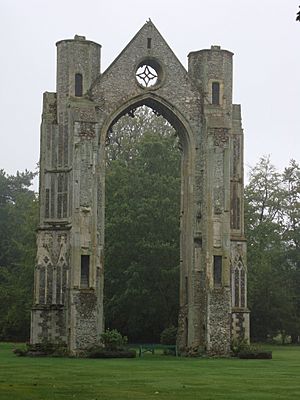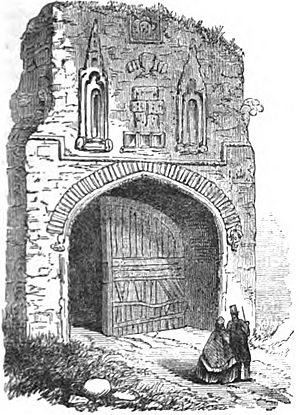Walsingham Priory facts for kids
Walsingham Priory was a special religious building in Walsingham, Norfolk, England. It was home to a group of religious men called Augustinian Canons. A "priory" is a type of monastery, which is a place where monks or canons live and pray together. This priory was taken over by the king, Henry VIII, during a time known as the Dissolution of the Monasteries. This happened when King Henry VIII closed down many monasteries in England.
The priory was very famous because it had a special shrine. This shrine was a replica of the house where the Holy Family (Jesus, Mary, and Joseph) lived in Nazareth. Many people came to visit this holy place. Today, you can still visit the Walsingham Abbey Grounds and the Shirehall Museum.
Contents
The Story of Walsingham Priory
The village of Walsingham is located near the sea in Norfolk. Walsingham Priory began a very long time ago, even before the year 1066. The chapel of Our Lady of Walsingham was confirmed to the Augustinian Canons about a hundred years later. It was then built inside the priory grounds.
A Famous Place for Pilgrims
From the very beginning, this shrine dedicated to Our Lady was a very famous place for pilgrims. A pilgrim is someone who travels to a holy place for religious reasons. People came from all over England and even other countries. They continued to visit until King Henry VIII closed the priory in 1538. Even today, the main road that pilgrims used to take is still called the Palmers' Way. The canons of Walsingham received many gifts of land and money. Many people also believed that miracles happened at Our Lady's shrine.
Many important people visited Walsingham Priory. Several kings of England came on pilgrimage:
- Henry III visited in 1241.
- Edward I came in 1280 and 1296.
- Edward II visited in 1315.
- Henry VI came in 1455.
- Henry VII visited in 1487.
- Henry VIII came in 1513.
A famous scholar named Erasmus also visited Walsingham in 1511. He left a poem there as an offering. Years later, he wrote about the great wealth and beauty of Walsingham Priory. He also tried to explain some of the reported miracles in a more scientific way.
The Priory's End
In 1537, the last leader of the priory, Prior Richard Vowell, was trying to please King Henry VIII's chief minister, Thomas Cromwell. However, another canon, Nicholas Milcham, was accused of planning to go against the king's decision to close smaller monasteries. He was found guilty and sadly, he was put to death outside the priory walls.
In July 1538, Prior Vowell agreed to the destruction of Walsingham Priory. He even helped the king's officials remove the statue of Our Lady and many valuable gold and silver items. For helping the king, the prior received a large yearly payment. Fifteen other canons also received smaller payments.
After the shrine was taken apart and the priory was destroyed, King Henry VIII sold the land. A private house was later built on the same spot. An old song called "A Lament for Walsingham" shows how sad many faithful people felt when their beloved shrine was lost.
Images for kids
 | William L. Dawson |
 | W. E. B. Du Bois |
 | Harry Belafonte |





